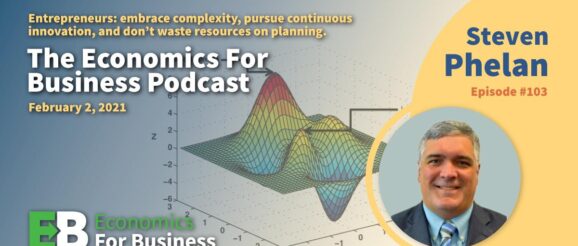Steven Phelan: Embrace Complexity, Pursue Continuous Innovation, Don’t Waste Time on Planning | Hunter Hastings, Steven E. Phelan

Steven Phelan: Embrace Complexity, Pursue Continuous Innovation, Don’t Waste Time on Planning
A rapidly advancing strand of theory has enabled great advances in the understanding of complex adaptive systems. Austrian economics is quintessential complexity theory; Austrians recognize that economic systems exhibit emergent outcomes as a result of the myriad interactions of consumers and businesses, value propositions and value perceptions, technologies and channels, and the innumerable transactions and exchanges that take place. The future is unknowable — we can’t know what will happen, and we don’t even know what can happen — and the system can sometimes feel turbulent and chaotic.
How should businesses manage complexity? They shouldn’t. It’s not manageable. No plan survives the first contact with customers is the way Steve Blank famously puts it.
What’s the answer? Don’t plan. Implement an Austrian Business Model (see Mises.org/E4B_103_Video) and embrace the complexity of the marketplace.
How do you do that? Professor Steven Phelan uses the complexity theory metaphor of the dancing rugged landscape. Think of the market or business sector in which you are operating as a landscape of peaks and valleys. You can see some of them but not all of them. Your view may be improved if you have more knowledge about where you are and where you are trying to get to, but knowledge is never complete. And the landscape is not stable — new peaks form, old peaks move and crumble, valleys become deeper. The pursuit of new economic value is the search for peaks, locations of high value that your business can capture, if you can get there. A plan won’t get you there, because you can’t see a pathway and the destination is going to move and change anyway. And you might identify another, better peak as you explore, and you’ll make an unplanned change in your journey to switch destinations.
Professor Phelan sums up the many choices open to entrepreneurs in complex environments under two approaches.
Approach 1: I believe I can see a peak, and identify a pathway to reach it.
You will never be right. But there are smart actions:
Approach 2: I don’t know where the peak is, but I believe I am in an opportunity-rich landscape.
Don’t get trapped — and waste all your resources — in blind random searching.
As Professor Phelan states: the work is never done. No landscape is unchanging. No peak lasts forever.
Additional Resources
“The Entrepreneur In A Dancing Rugged Landscape” (on Twitter): Mises.org/E4B_103_Twitter
“The Complexity of Opportunity” by Steven Phelan (PDF): Mises.org/E4B_103_Paper1
“Austrian Theories of Entrepreneurship: Insights From Complexity Theory” by Steven Phelan (PDF): Mises.org/E4B_103_Paper2
